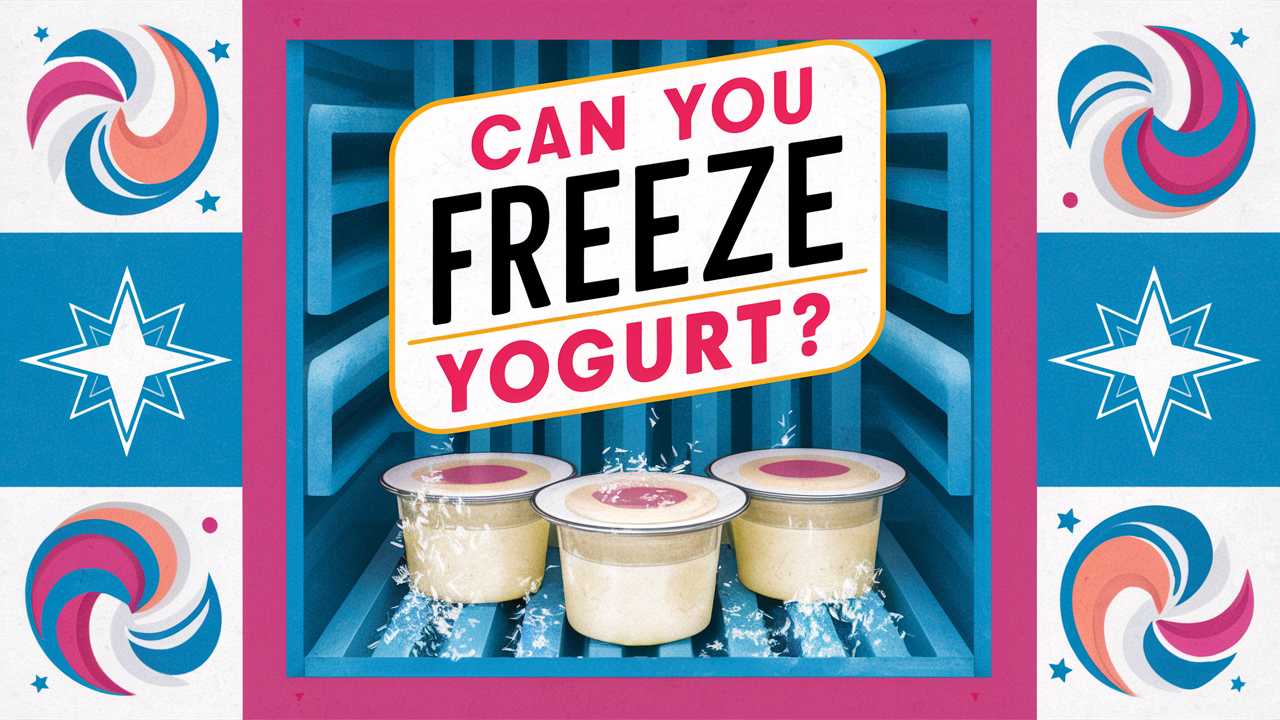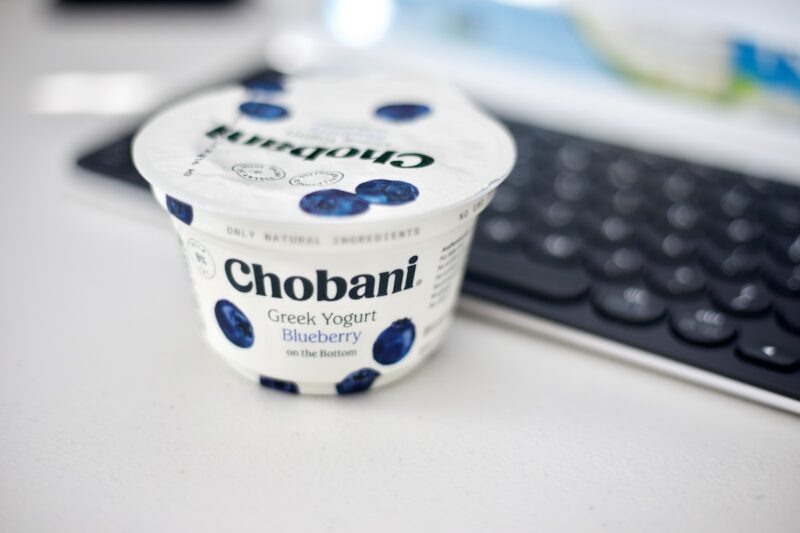Can you freeze yogurt? In this article, we’ll explore this question in-depth, considering the intricacies of freezing, the effects on texture and flavor, storage tips, health implications, and creative ways to repurpose frozen yogurt.
The Basics of Freezing Yogurt
To kick things off, yes, you can indeed freeze yogurt! The freezing process involves slowing down the activity of the awesomely beneficial bacteria within yogurt, which leads to a pause in fermentation. However, the specifics behind how to freeze yogurt effectively are essential to maintaining its quality and taste when it thaws.
How to Freeze Yogurt
Choose the Right Yogurt: The type of yogurt matters. Plain, unflavored varieties freeze better than those with added sugars, fruits, or preservatives. Greek yogurt is particularly popular for freezing due to its thickness.
Portioning: If you have a large tub of yogurt, portion it into smaller containers. This not only makes it easier to thaw only what you need but also helps avoid the hassle of repeated freezes and thawing cycles.
Use Airtight Containers: Make sure to use freezer-safe containers, ideally those that are airtight. This helps prevent freezer burn, which can ruin the texture and flavor. If using a plastic bag, squeeze out as much air as possible before sealing.
Label and Date: Don’t forget to note the date on your containers. Yogurt can maintain its best quality in the freezer for about 1-2 months, though it can remain edible beyond that timeframe if kept at a constant temperature.
Freeze the Yogurt: Place the containers in the freezer. Lay bags flat to save space and ensure even freezing.
Thawing Methods: When you’re ready to enjoy your frozen yogurt, it’s best to thaw it in the refrigerator overnight. However, you can also put the sealed container in a bowl of cool water for a quicker thaw.
What Happens to Yogurt When You Freeze It?
Understanding the science behind freezing yogurt can clarify the subsequent changes in its texture and flavor.
Textural Changes
The formation of ice crystals during freezing is significant. While a small yogurt portion might freeze relatively quickly, large containers can develop larger ice crystals, leading to a grainy texture once thawed. This impact is particularly noticeable in yogurts that are higher in water content.
When yogurt is frozen and then thawed, it may separate, forming liquid whey. While this separation is natural and harmless, many find it unappealing. Just give it a good stir post-thawing, and you can restore some of its original texture.
Flavor Alterations
The flavor profile of yogurt remains relatively unchanged after freezing; however, any added ingredients may react differently. For instance, yogurts with fruits or added sugars might taste duller or become chunky once thawed, compared to their fresh state.
Nutritional Value Retention
A common concern for many health-conscious yogurt lovers is how freezing affects nutritional value. Good news—freezing preserves most of yogurt’s nutritional benefits, such as probiotics, proteins, and vitamins. Research indicates that while some probiotics might decrease in number, the strains that survive the freezing process are still capable of delivering health benefits.
This aspect makes frozen yogurt a suitable option for nutritious smoothies, snacks, or desserts later on. Whether your goal is to boost your protein intake or enjoy a refreshing treat, understanding yogurt’s resilience in freezing instills confidence in repurposing this dairy delight.
Smart Storage Practices
The temperature at which yogurt is stored can greatly affect its quality upon thawing. It’s crucial to ensure that your freezer maintains a consistent temperature of 0°F (-18°C) or lower. A fluctuating temperature can lead to the formation of ice crystals and spoilage.
Checking for Quality
Even with ideal storage practices, there are signs that indicate yogurt may not be fit for consumption after freezing. Look for:
Off-Smells: If the yogurt has developed an unusual odor upon thawing, it’s best to err on the side of caution and dispose of it.
Unusual Colors or Mold: Fresh yogurt should be a consistent color. If you notice any spoilage signs or mold growth, it’s time to toss it.
Separation: While watery yogurt isn’t necessarily spoiled, excessive liquid or graininess may indicate a decline in quality.
Creative Uses for Frozen Yogurt
Freezing yogurt opens up a world of culinary creativity! Instead of simply enjoying it as a thawed snack, consider these imaginative uses for your frozen yogurt.
Smoothies and Smoothie Bowls
Frozen yogurt can serve as a fantastic base for smoothies. Blend it with fruits, leafy greens, or nut butters for a refreshing, nutrient-packed drink. Smoothie bowls, topped with granola, fresh fruits, and nuts, also make for an appealing breakfast or snack.
Frozen Yogurt Bark
Let’s make dessert! Pour your yogurt onto a baking sheet lined with parchment paper, spreading it evenly. Top with fruits, nuts, and even a drizzle of honey, then freeze until solid. Break it into pieces for a satisfying, guilt-free treat.
Frozen Desserts
Making frozen yogurt pops is another delightful way to use your frozen yogurt. Blend it with fruit juice, pour it into molds, and stick in some popsicle sticks. After a few hours in the freezer, you will have a delicious and nutritious frozen snack.
Common Misconceptions About Freezing Yogurt
Throughout popular discussions about food storage, a variety of myths and misconceptions can circulate regarding the freezing of yogurt.
Myth 1: Freezing Destroys Probiotics
As mentioned earlier, while some beneficial bacteria may reduce in quantity, many remain effective even after freezing. It’s a common oversimplification to assume that freezing yogurt negates all health benefits.
Myth 2: Frozen Yogurt Never Thaws Right
While frozen yogurt may not return to its exact original state, the texture can be adequately restored with a good stir. Many would argue that the differences are minor, especially if the yogurt is used creatively.
Myth 3: All Yogurts Freeze Equally
Not every yogurt is created equal when it comes to freezing. Varieties with high sugar content or added thickeners may not hold up as well. Always consider the yogurt’s composition before deciding to freeze.
Health Considerations
When indulging in frozen yogurt, there are health considerations to keep in mind, especially if you have specific dietary needs.
Lactose Intolerance
For those who are lactose intolerant, freezing yogurt doesn’t necessarily remove lactose content; however, some brands offer lactose-free options that freeze well. Moreover, the probiotic strains can help digest lactose, potentially making yogurt easier to enjoy even for those with sensitivity.
Sugar Consciousness
Be aware that flavored yogurts, especially those high in added sugars, can pack in calories. Aim to freeze plain or low-sugar versions if you’re more health-conscious.
Allergies
Read labels carefully, especially if you have allergies to nuts, soy, or other ingredients commonly found in specialty yogurt brands. Different brands offer various formulations, ensuring you can enjoy frozen yogurt with peace of mind.
Environmental Impact of Waste
Freezing yogurt not only serves the purpose of extending shelf life but also assists in reducing food waste. By freezing surplus yogurt, you can avoid the guilt that often accompanies wasted food. This practice aligns with sustainable living goals, encouraging mindfulness in food preparation and consumption.
As food enthusiasts, it becomes our responsibility to make conscious choices about how we handle and store our favorite foods. Extending the life of food items through freezing is a step toward fostering a more sustainable approach to eating.
The Psychology of Food Storage
When we think about food storage and preparation, there’s often a deeper psychological aspect at play. The act of freezing yogurt can also symbolize controlling our food environment.
Freezing allows us to be prepared for busy days when cooking or making snacks might not be feasible. It reflects a proactive mindset, providing a sense of security that we won’t have to reach for unhealthy options when hunger strikes. The flexibility of having frozen yogurt on hand enables creativity, experimentation, and spontaneity in the kitchen.
Conclusion
Freezing yogurt is not only feasible but also an excellent way to preserve a staple food. Understanding the nuances of freezing, proper storage practices, and creative culinary uses enriches our relationship with yogurt, enhancing both our dietary habits and kitchen experiences.








